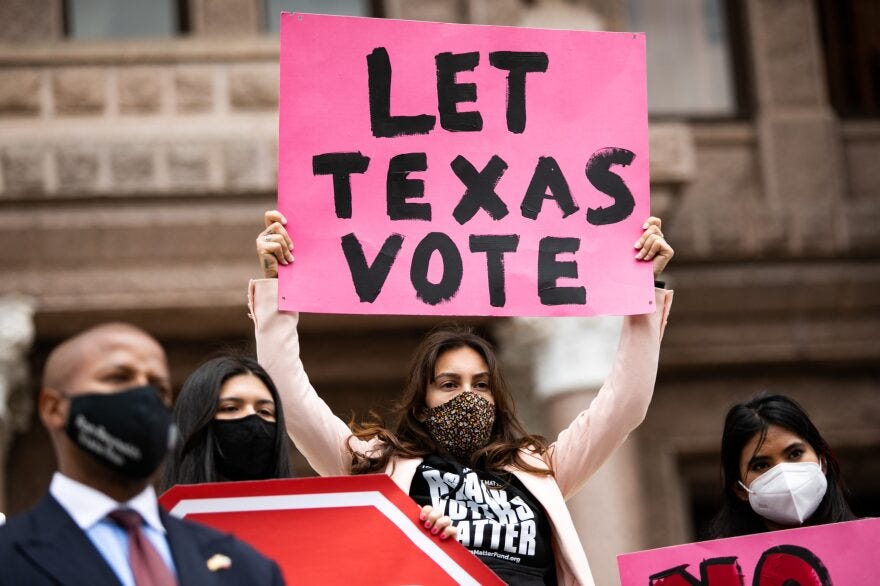Is Texas's voter suppression law working?
A report from the Lone Star State.
Welcome to a Wednesday evening edition of Progress Report.
It feels like a lifetime ago, given the many other voter suppression tactics being actively pursued by right-wing vigilantes and GOP lawmakers, but it was only last year that Republican-controlled states enacted a raft of voter suppression laws rivaled in scope only by the heyday of the Jim Crow era.
In total, 18 states have passed significant restrictions on voting rights, with none more expansive or pernicious than the law passed by Texas Republicans after a dramatic, months-long battle with Democratic lawmakers. Tonight, Miguel Rivera, a staffer at the Texas Civil Rights Project, makes his Progress Report debut with look at just how Texas’s various anti-voter tactics have played out so far this fall.
Side note: Given the timeliness of this story, the planned piece on this election’s most significant under-the-radar ballot initiatives will now come out later this week. Lots on the way for readers here at Progress Report!
by Miguel Rivera
In Texas, early voting is well underway in the first November election since the state legislature passed SB1, an omnibus voter suppression bill that has created chaos and confusion in elections departments across the state.
Its impact is already being felt.
SB1 was designed to specifically disenfranchise voters in the bluest parts of the state; Harris County, home to Houston and its sprawling metropolitan area, was its prime target. The law explicitly bans drive-thru voting and 24-hour voting, methods pioneered by Harris County in 2020 to mitigate the impact of the pandemic. It also created much higher barriers to vote by mail, which also was meant to suppress turnout in blue counties.
Early returns suggest that the law is having its intended effect in Harris County. Over the first week of early voting, turnout was down 17.5% compared to the 2018 midterm elections. As of yesterday, early voting is down by 600,00 votes in the 30 most populated counties in Texas, taking turnout from 27% in 2018 to 19% this year.
Weaponizing the Big Lie
Just days before the start of early voting, the Texas Secretary of State’s office sent a letter to the new Harris County Elections Administrator requesting further information from the county regarding an ongoing audit of its 2020 election results. The request was conspicuously timed, given the department’s singular focus on running smooth elections in the state’s largest county. As if the intent wasn’t obvious enough, the Texas AG’s office announced that it would be sending a legal task force to Harris County to police the election.
Not simply a nuisance, the move has also been widely criticized as an overt effort to put targets on the backs of Harris County elections officials and give pretense to challenge the results. In response, several civil and voting rights organizations sent a joint letter to the Department of Justice urging that they deploy federal observers to Harris County, which had a long history of voter intimidation and suppression even before the current fever of anti-democratic election denialism.
Elsewhere, it’s not the state that is making life hell for election administrators, but conspiracy theorists operating outside the law.
Tarrant County, home to Fort Worth and over 2 million residents, has faced repeated probes from right-wing groups challenging results from the 2020 election and undermining the efforts of its elections department. One group has sent letters and emails to the elections office requesting access to data from the 2020 election, citing their concerns regarding “suspicious results,” even though Republicans won all statewide elections and Republicans continue to control the Fort Worth mayorship.
In response to rising claims of voter fraud, Elections Administrator Heidar Garcia held a mock election in late September for members of the public to participate in the process and build confidence in the election system.
In recent decades, Fort Worth has been Texas’ largest red city, but in the most recent elections, Tarrant County has tilted in favor of the Democrats, which has earned the county its reputation for being a bellwether county and potentially emblematic of the state’s future.
Whether Texas does wind up shifting blue hinges on whether this voter suppression is here to stay.
Wait, Before You Leave!
Progress Report has raised over $6.8 million dollars raised for progressive candidates and causes, breaks national stories about corrupt politicians, delivers incisive analysis, and continues to grow its paid reporting team. Yes, we pay everyone.
None of the money we’ve raised for candidates and causes goes to producing this newsletter or all of the related projects we put out. In fact, it costs me money to do this. So to make this sustainable, hire new writers, and expand, I need your help.
For just $5 a month, you can buy a premium subscription that includes:
Premium member-only newsletters
Exclusive interviews with progressive leaders.
Financing new projects and paying new reporters
You can also make a one-time donation to Progress Report’s GoFundMe campaign — doing so will earn you a shout-out in an upcoming edition of the big newsletter!





Great insights, Jordan.
Recently moved to Texas n was surprised to find an apparent poll tax. 1st had to buy license plates n register vehicle (sticker)at one location, crosstown at another facility only then to obtain new drivers license, only then could register to vote (state issued ID)cost $25.
I then inquired to the staffer , if I only wanted a state pic ID to vote, would there
be a charge. I was told , yes same $25.
I early voted ,only 2 miles north of my suburban residence, but my actual polling place is 6 miles west.
So voting , even w/ just ID is a minimum
imposition of all day ,n cost minimum 2 cab rides beside the $25 fee